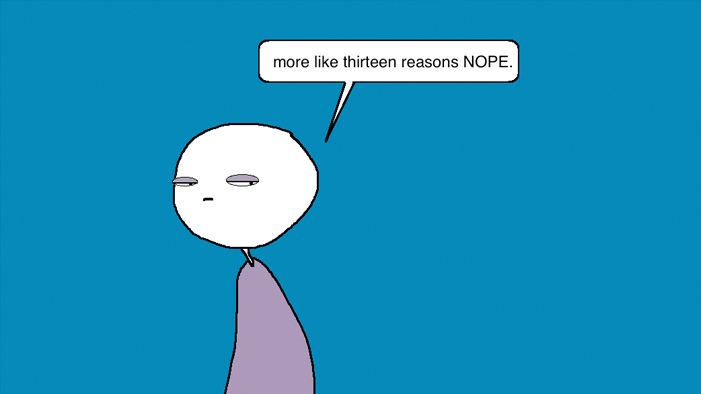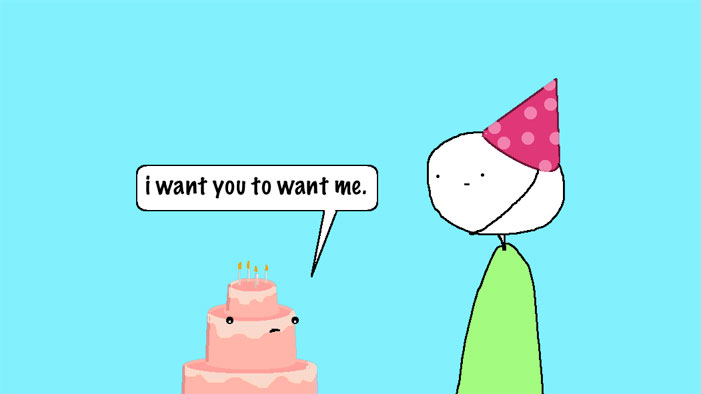Auntie SparkNotes: My Friend Doesn’t Like ’13 Reasons Why’

Dear Auntie,
I’m a sixteen-year-old who has watched 13 Reasons Why on Netflix, and while I’ve never read the book, I liked the show. (If you haven’t heard of it, the story is about a high schooler named Hannah Baker who commits suicide, leaving behind thirteen tapes for her friend Clay to listen to about why she did it and about the people at school who influenced her to do it.)
I also have a friend at school who we’ll call Joy. Joy, unlike me, doesn’t like the series. Although I can understand some of her reasons (e.g., shoddy acting), there was one huge one that got to me: That Hannah should not have blamed others in her tapes for taking her own life and that it was her own decision to take her own life (as in, she didn’t consider other options).
She said that she believes that Hannah—who she thinks is a selfish and narcissistic character along with being mentally unstable—shouldn’t have martyred herself and used her suicide as revenge against others, and that the show glorifies suicide as an event purely caused by outside factors. She said that it’s a poor message to send to an impressionable audience (“suicide ideation,” in her words), and she admitted that she has gotten a little irked over how it’s been lauded by some people. She said she cannot imagine having someone commit suicide and blame her in post, especially if what she had done wrong enough to deserve a tape was very little compared to someone else who also got a tape.
While Joy definitely isn’t saying “she killed herself cuz she’s so weak hurr durr,” I find it shocking to think she’d pass so much judgement on a suicide victim. I was pretty sure that she, like any decent person, would know that a lot of bullying can make a victim feel like they can’t go through life. If you’re friends with somebody who takes their own life, you usually have no reason to feel like you could’ve stopped it. However, if you bully somebody to the point of suicide, then it’s definitely your fault.
I especially cannot understand these thoughts coming from her, who comes to the same high school as I do that has a strict anti-bullying policy. Not only do we have anti-bullying policies but we also have anti-bullying spirit weeks, speeches, and classroom PSAs about what can happen. For someone who is quite aware of the devastating effects bullying can have, how can Joy believe this? I tried to ask her more about this, but she insists that you can’t put someone’s life in the responsibility of another’s like that. I don’t understand how she can think that. Thoughts, Auntie?
Just one, Sparkler: that if you were hoping I’d send you on your way with a pat on the head and the reassurance that your friend is totally wrong and mean about this (and that you, conversely, are right and good and on the side of the angels), then I’m afraid you’re going to be disappointed.
Because for one thing, mindless validation of your infallible rightness just isn’t what we do ’round here. But for another, you must realize that not only is your friend not alone in her criticisms of 13 Reasons Why, but her feelings about the practice of blame-laying in the aftermath of a suicide are very much the norm, and shared by just about every mental health professional under the sun. The common wisdom on this subject is that a bully can make your life miserable — even hellish — but he cannot make you kill yourself. People are responsible for their own choices, and that’s true even if those choices are desperate or terrible or tragic.
Of course, that’s a take which you are welcome to disagree with… y’know, just as long as you’re doing so thoughtfully. If you’ve done your homework, if you’ve listened to a variety of perspectives, if you’ve considered the evidence and the arguments, and if after all that your conclusion is that suicide is not something a person chooses, but instead something that other people compel them to do? You would be entitled to that opinion— not because it would make you objectively correct, but because it would be a reasoned take that you came to through rigorous critical thought.
And if I had to guess, darling, I’d say that this questioning, information-seeking, critical-thinking process should be your next step — not just in spite of how uncomfortable it makes you, but because it does. One of the most interesting things about your letter is how rattled you are by the existence of your friend’s differing perspective, and how hard you’re working to distance yourself from that perspective by framing it as so outrageous as to be morally incomprehensible. To hear you tell it, her opinion isn’t just foreign; it’s indecent. And so of course you cannot understand it, because you are a good person… which just happens to conveniently let you off the hook for having to think too deeply about a subject that was really giving you the heebie-jeebies.
The thing is, those subjects are the ones that really deserve your thoughtful attention.This issue is a pressure point for you, which makes it that much more important that you dig past your knee-jerk outrage to understand why it bugs you so much. And if you’re not sure how to begin doing that, a good starting point is to explore the implications of what you already believe. For instance, let’s assume it’s true that “if you bully somebody to the point of suicide, then it’s definitely your fault”; whose fault is it, then, when someone who isn’t being bullied attempts suicide? Does the responsibility trickle down to the last person who hurt his feelings? The last girl who broke his heart? The last friend he had a spat with? If not, why?
And if bullying is wrong specifically because of its potential to incite self-harm, what does it mean that so many people are bullied in high school, with varying degrees of severity — but that of those people, only a small fraction ever attempt suicide? Is bullying only a problem because of its potential to result in a tragic outcome? Would Hannah’s tormentors be less culpable for their cruelty if she hadn’t committed suicide? Or conversely, would Hannah’s actions still be the fault of her bullies if she’d chosen another path? If she channeled her unhappiness in a way that resulted in her graduating as valedictorian and going to an Ivy League school, do the bullies get to claim credit for her success? What if she chose to exact revenge by hurting someone else, instead of herself? If Hannah had murdered everyone who wronged her instead of calling them out on cassette tapes, would they be to blame for their own deaths? At what point, if any, would you consider a bullying victim to be responsible for the actions she takes in response?
Ask yourself these questions, and take your time. They’re not easy, and there are no right answers. But wrestling through this stuff is important, not just because it’ll make you better-informed about the opinions you hold, but also because it’ll help you understand how other people might hold different ones. That first round of questions, particularly, should give you some insight into why your friend believes that 13 Reasons Why conveys an irresponsible message about suicide — and more broadly, how reasonable and decent people can disagree on certain issues even when they both occupy the same moral common ground. Happy thinking.
Got something to say? Tell us in the comments! And to get advice from Auntie, email her at advice@sparknotes.com.
Want more info about how this column works? Check out the Auntie SparkNotes FAQ.














